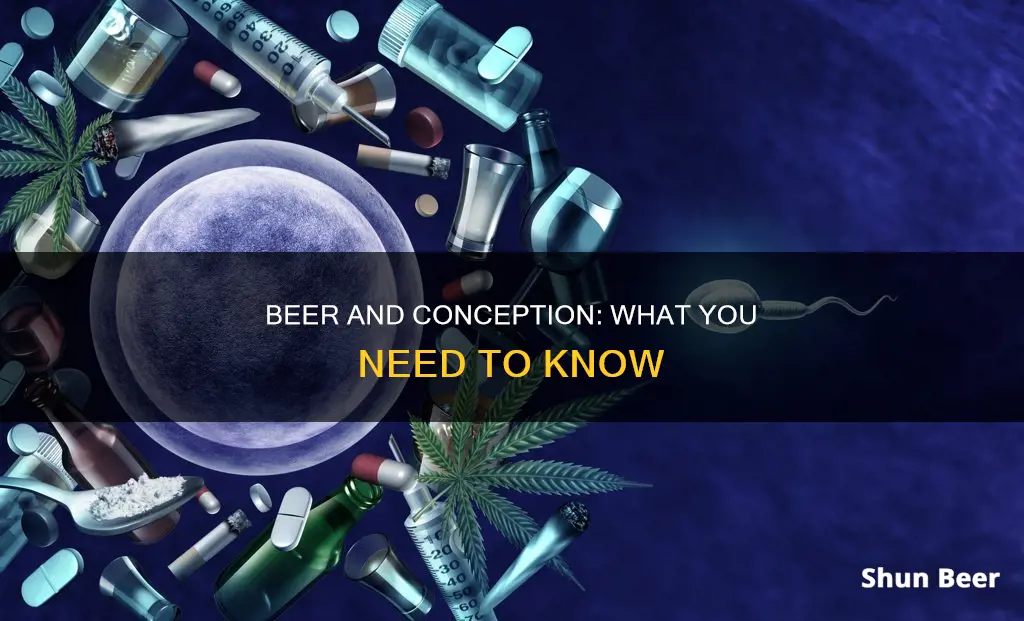
Alcohol is the most widely used recreational substance in the United States, with 86.4% of people over 18 reporting consumption at some point in their lives. However, alcohol use is linked to multiple reproductive risks, including Fetal Alcohol Syndrome, an increased risk of miscarriage, and a decreased chance of live birth. While the effects of alcohol consumption on fertility are less understood, it is known to negatively impact both male and female fertility and increase the risk of early pregnancy loss.
Research suggests that even low to moderate alcohol consumption can be associated with reduced fertility in both men and women. Heavy drinking can cause changes in ovulation, cycle regulation, and ovarian reserve in women, and decrease testosterone and reduce sperm production in men. Therefore, it is recommended that both women and men avoid consuming alcohol altogether when trying to conceive.
| Characteristics | Values |
|---|---|
| Alcohol consumption and fertility | Alcohol consumption may impact fertility and the ability to conceive. |
| Alcohol consumption and pregnancy | Alcohol consumption is not recommended during pregnancy as it can harm the baby. There is no known "safe" level of alcohol consumption during pregnancy. |
| Alcohol consumption and IVF treatment | Alcohol consumption before and during IVF treatment negatively affects outcomes, increasing the risk of miscarriage. |
| Alcohol consumption and male fertility | Alcohol consumption can cause decreased testosterone levels, reduced sperm production and quality, and testicular atrophy in men. |
| Alcohol consumption and female fertility | Alcohol consumption can cause changes in ovulation, cycle regulation, and ovarian reserve in women. It can also prevent proper implantation in the uterus, increasing the risk of early pregnancy loss. |
| Recommendations | It is recommended to abstain from alcohol consumption or at least cut back when trying to conceive. |
What You'll Learn

Alcohol affects fertility in both men and women
Alcohol's Impact on Female Fertility
Health authorities have been increasing their warnings about alcohol to women wanting to conceive because of research showing it can be harmful to fertility and the health of a pregnancy and baby. Studies show alcohol can affect hormones and ovulation, making it harder to time sex for conception, and that even light drinking can increase the time it takes to get pregnant. Heavy drinking can cause many health problems and is linked to heavy or irregular periods and infertility.
Alcohol's Impact on Male Fertility
Alcohol consumption in men can also cause difficulties with fertility. Some studies on long-term, heavy alcohol use have reported reduced gonadotropin release, testicular atrophy, and decreased testosterone and sperm production. Other studies of men who drink heavily have documented increases in gonadotropins and estradiol, independent of liver disease, with decreased testosterone as a consistent finding. Alcoholism is also associated with liver dysfunction, which can result in hormonal disturbances due to the inability to metabolize estrogens. A decrease in the quality of semen parameters has also been consistently documented in heavy consumers of alcohol, even with occasional azoospermia. Furthermore, it has been well documented that alcohol abuse and acute intoxication are associated with sexual dysfunction, including issues with arousal and desire, as well as erectile and ejaculatory dysfunction, all of which could lead to difficulties conceiving if men are unable to have effective intercourse.
Grapefruit Beer and Bayer: A Risky Mix?
You may want to see also

Heavy drinking can cause period problems and irregular ovulation
The effects of alcohol on hormone balance can lead to irregular ovulation and periods. Chronic alcohol use can cause reproductive issues, including difficulty conceiving and the complete cessation of the menstrual cycle. The body needs the proper balance of estrogen and progesterone, released in specific amounts, for ovulation and menstruation to be regular. Heavy drinking can disrupt this balance, causing irregular ovulation or stopping it altogether.
Heavy drinking can also impact fertility. Alcohol can affect when you ovulate in your cycle, making it harder to target your fertile window if you are trying to conceive. Additionally, heavy drinking can decrease the hormones needed for sperm production in men.
The negative impact of alcohol on conception and pregnancy is well-established. The NHS strongly advises against drinking alcohol if you are pregnant or trying to get pregnant. To increase the likelihood of a successful and healthy conception, it is advisable to abstain from drinking alcohol altogether.
Beer and Stomach Infection: Is It Safe to Drink?
You may want to see also

Alcohol can harm a fertilised egg and cause birth defects
Alcohol can indeed harm a fertilised egg and cause birth defects. Even a small amount of alcohol can pose a health risk to an unborn child, so it is recommended that both women and men avoid consuming alcohol altogether when trying to conceive. Alcohol can cause harm to a fertilised egg and even kill it immediately after conception. After fertilisation, the developing embryo attaches itself to the wall of the mother's uterus. Just three weeks after fertilisation, alcohol-induced birth defects can affect the developing embryo, including the brain, heart, central nervous system, and facial features (as seen in foetal alcohol syndrome).
Drinking alcohol while trying to conceive also increases the risk of early pregnancy loss. For women, heavy drinking can cause changes in ovulation, cycle regulation, and ovarian reserve. It can also prevent proper implantation in the uterus, resulting in an increased rate of early pregnancy loss, even before a woman realises she is pregnant. For men, heavy drinking has been shown to decrease the hormones needed for sperm production.
The negative impact of alcohol on conception and pregnancy is well-established. The NHS strongly advises against drinking alcohol if you are pregnant or trying to become pregnant. Abstaining from alcohol is the safest approach when trying for a baby.
Drinking Beer on the Porch: Legal or Not?
You may want to see also

Men's fertility is affected by alcohol, including sperm quality
Alcohol consumption can negatively impact men's fertility and sperm quality. Research shows that heavy drinking can lower testosterone production, reduce libido, and make it harder to get and maintain an erection. It can also decrease sperm quality by reducing the hormones needed for sperm production, leading to a lower sperm count.
One study of more than 1200 Danish men found that those who drank five units of alcohol per week had lower sperm counts and lower sperm quality than those who did not drink alcohol. Another review of 15 studies concluded that daily drinking is associated with reduced semen volume and morphology (the percentage of sperm that look normal under a microscope).
The effects of low to moderate alcohol consumption on male fertility are less clear. Some studies have found no correlation between male alcohol consumption and fecundity, while others have shown a decrease in normal sperm morphology in men who regularly drink alcohol. Overall, men who drink heavily should aim to reduce their alcohol intake to improve their fertility and sperm quality.
RV Beer Drinking: What You Need to Know
You may want to see also

There is no 'safe' level of alcohol to drink when pregnant
Drinking alcohol while trying to conceive is not recommended. Alcohol has been linked to multiple reproductive risks, including Fetal Alcohol Syndrome, an increased risk of miscarriage, and a decreased chance of live birth. Heavy drinking can also cause changes in ovulation, cycle regulation, and ovarian reserve, and prevent proper implantation in the uterus, resulting in early pregnancy loss.
For men, heavy drinking has been linked to decreased testosterone, reduced sperm production, and testicular atrophy. Additionally, liver dysfunction caused by heavy drinking can create hormonal disturbances as the liver is unable to metabolize estrogens properly.
While light to moderate drinking has not been linked to significant infertility cases, alcohol consumption during pregnancy is a different story. There is no safe level of alcohol to drink when pregnant. Any amount of alcohol can pose a health risk to an unborn child, and drinking during pregnancy can cause fetal growth restriction, fetal alcohol spectrum disorder, and learning difficulties and behavioural problems in later life for the baby.
The effects of heavy drinking during pregnancy can be difficult to reverse, and even small amounts of alcohol can harm the baby because their liver has not developed properly and their body cannot process the alcohol. Therefore, it is recommended that women who are pregnant or trying to conceive abstain from drinking alcohol entirely.
Beer and Pregnancy: What You Need to Know
You may want to see also
Frequently asked questions
It is not recommended to drink beer or any other alcoholic beverage while trying to conceive, as alcohol affects fertility in both men and women.
Alcohol can disrupt normal hormone functioning and cause imbalances in reproductive hormone levels, affecting ovulation, cycle regulation, and implantation. It can also negatively impact general health, making it harder to get and stay pregnant.
It is advisable to abstain from alcohol completely when trying to conceive, as there is no known "safe" level of alcohol consumption during pregnancy.
Drinking alcohol while trying to conceive can increase the risk of early pregnancy loss and miscarriage. It can also cause harm to a fertilised egg and lead to birth defects and lifelong physical, mental, and behavioural disabilities in the child.
To increase your chances of getting pregnant, it is recommended to make lifestyle changes such as regular exercise, abstaining from alcohol, and maintaining a healthy weight.







